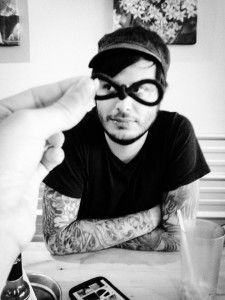Age: 28
Location: Gainesville, FL.
Education: B.A. in English (University of North Florida, 2014). MFA Creative Writing, Fiction (University of Florida, 2018).
The Writer
Do you have a specific writing style?
I think in long, complicated sentences. With fiction, I attempt to lessen my natural verbosity: give me simplicity and directness. I used to think that the right readers would unravel my complexity and understand me. Wrong. I have to provide the gaps for others to fall into, not dig out of.
I prefer nameless subjects; verbs need to be the standout words, even when they are nouns or adjectives and unused before. I beckon “The Sentence is a Lonely Place,” where Gary Lutz has theorized precisely in these ways.
I am a glutton for invoking titles. I often have 4-5 established titles in mind at all times. The title contains the big picture; nothing matters more to an Aquarius.
Everyone in the story is insignificant to me, and only what happens in the spaces between them matter. Places, however, are protagonists I can get behind. They hold all of the animals. That’s all we are.
Do you see writing as a career?
I could impart in other career-driven ways, sure, but why? Writing is the only immortality, as far as “humanity” goes. If a generation a thousand years from now is wanting to translate even a line of what I’ve thought or use it in context of their present, a lifetime of achievement is accomplished. Anyone praising me in the same vein in the here and now will help me move along, maybe cut me a check. That’s all ideology, but where else can you live as a dreamer? I see no future in industries or economies, but the ability to write well. The want to live in someone else’s mind will always be warranted as well.
The Work
Tell us about your work in Crack the Spine.
“We Are Evergreen” is derivative of many spaces, the most obvious being a cemetery. Evergreen Cemetery of Jacksonville, FL is the fictionalized base.
What inspired this work?
If anyone is familiar with the South Korean neo-noir film Oldboy, they may recognize the origin of the main title; the protagonist in that film wails “We Are Evergreen” in a sobering (crying) rendition of his high school’s anthem. His voice in that scene, along with the many dynamics of that film, challenge what the quality of life is and if your identity stays more true if you die before you are corrupted.
Is there a main theme or message in this piece?
I’m always interested in the imbalance between “animals” and “humans.” A cemetery is full of “animal” life, yet when spoken of or walked through, the impression is an intense sympathy or even self-death. “We Are Evergreen” is an aim to capture the life of nature, despite the stones and bones of man.
Tell us about another project you have published or are currently working on.
I’ve done some ghostwriting and small-time published work. On the flip side, part of my new MFA candidacy at UF is to create a publishable book for a thesis. I’m brewing animal rights, astrology, Mexican/Aztec/Mayan impressions, and other left-fielding ingredients. The next three years of studying under the likes of Padgett Powell, Amy Hempel, David Leavitt, and Jill Ciment will feed into that culmination, in whatever ways they shape me. In the meantime, I will tirelessly submit to all the journals I slave over.
When can we find this work?
Ask in me three years, and I will send you a copy myself.
The Methods
What time of day or night makes you most productive as a writer?
My peak writing hours are 10 p.m. – 6 a.m. I don’t have drugs or drinking to push my writing, so sleepy delirium tends to win. In fact, most of my dreams are turned into fictions. Maybe I was sleepwriting all those times.
What are your thoughts on writing at a computer vs. writing longhand?
The great irony: my handwriting is atrocious. Typing allows me to use my native technical skills to assist myself in dry spells. Dragging a whole paragraph to form a new order is something not easily done longhand. If I could find a typewriter that doesn’t retire too early, I think that would be the medium worth using.
What is your best piece of advice on how to stay sane as a writer?
Don’t. Get crazy. Upon acceptance to MFA@FLA, the greatest writing honor of my life so far, Padgett Powell said to me, “We get plenty of what I called ‘earnests.’ I don’t want any earnests here.”
The Madness
What is your favorite book?
There is No Year, Blake Butler
What is your favorite word?
Despondent.
What’s in that cup on your desk?
Always tea. Never coffee. Maybe coconut water.
Chocolate or Vanilla?
Vanilla: in smells, tastes, humor—everything. Chocolate is lush.
Cats or Dogs?
Ayn Rand, in a letter to Cat Fancy:
I can demonstrate objectively that cats are of a great value, and the carter issue of Cat Fancy magazine can serve as part of the evidence. (“Objective” does not mean “disinterested” or indifferent; it means corresponding to the facts of reality and applies both to knowledge and to values.)
This is the only satisfying passage I’ve ever read by Ayn Rand.
Cats.
Pen or Pencil?
Death to the pencil, but perhaps not the eraser. Destruction is creation. Ink cannot change once dried, and that permanency counts for something. The only people who ask me for whiteout are over 50; I don’t trust their life decisions if they sloppily cover up words with dated tools.
Additional Reading on Alex
http://talonreview.blogspot.com/
Exothorpe and Anyways, That’s My Story on Amazon.com

